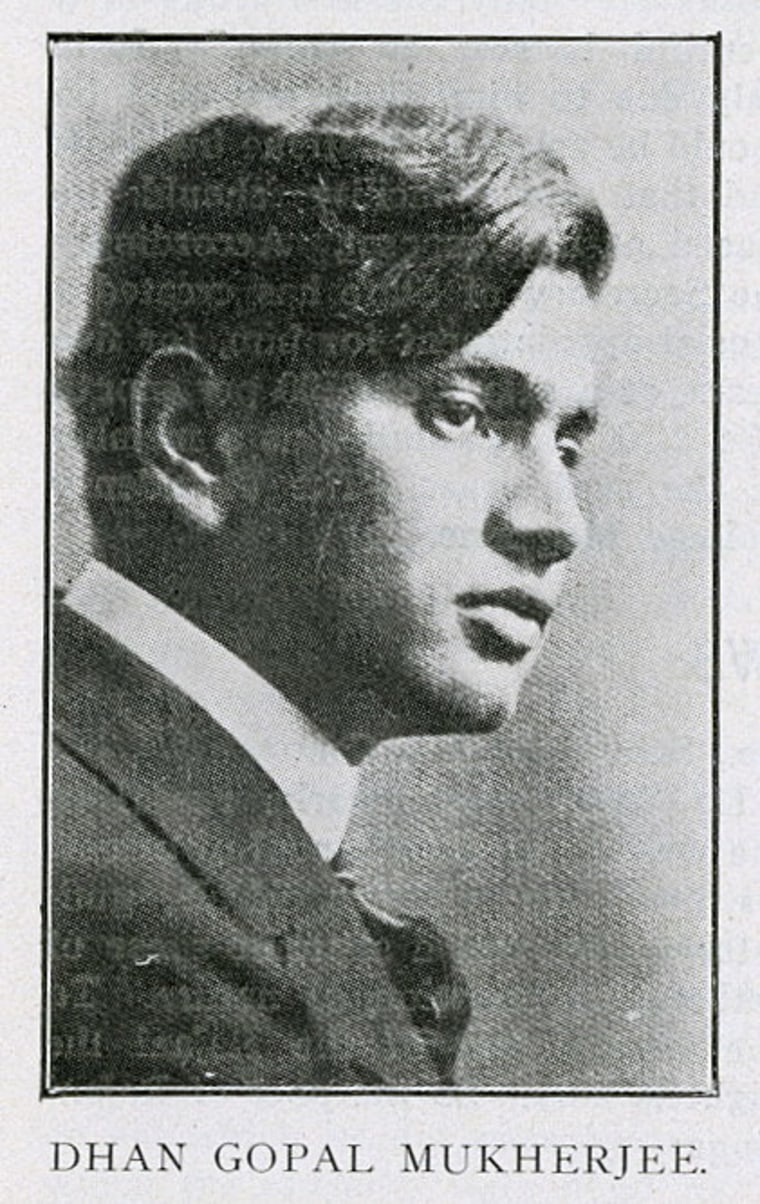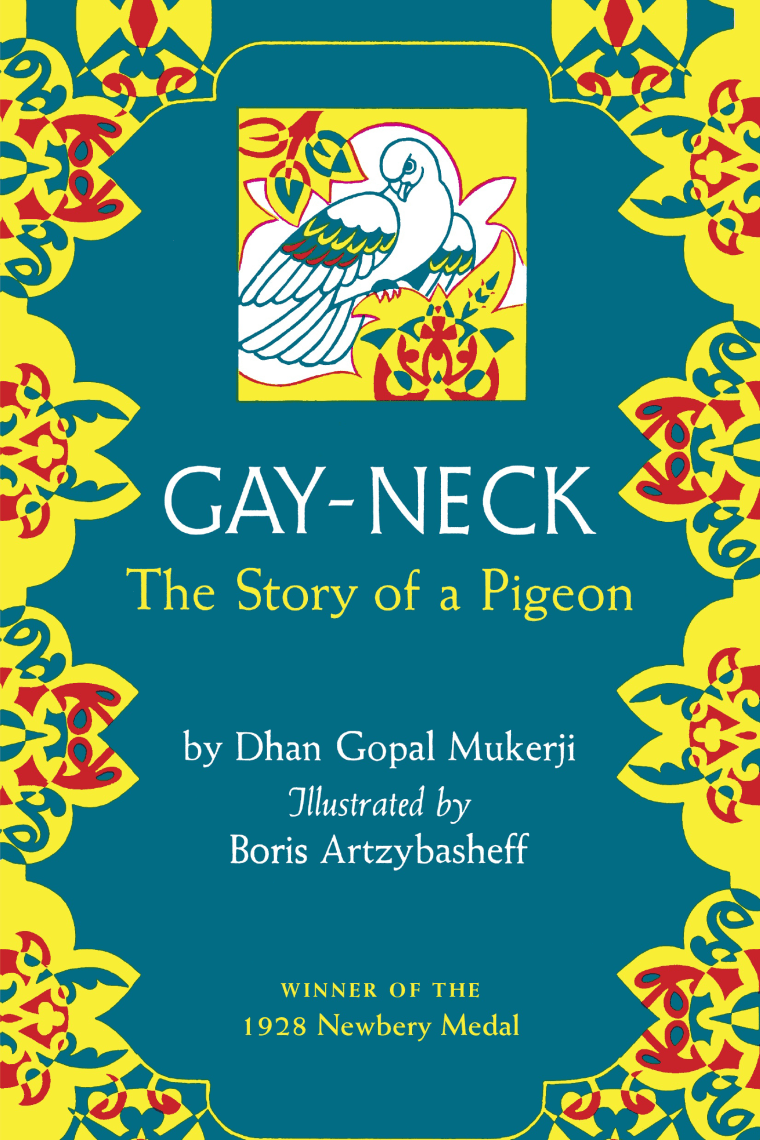It may be the first children’s book by an Indian-American author to win the John Newbery Medal for American children's literature, but Dhan Gopal Mukerji’s “Gay-Neck: The Story of a Pigeon” has been largely forgotten today, according to literature professor Oindrila Mukherjee.
First published on July 1, 1927, “Gay Neck: The Story of a Pigeon” tells the story of a beloved pigeon named “Gay-Neck” (the name is a reference to the iridescent colors on the bird’s neck) and the Indian boy who cares for him. The story, which was illustrated by the artist Boris Artzybasheff, follows the bird as he travels through Calcutta and is eventually enlisted into service in France during World War I.

“I teach creative writing at Grand Valley State University, and I interviewed there in 2011 during that big Midwestern blizzard," Mukherjee told NBC News. "The second day of the interview was cancelled so the then-chair of the department began talking to me to entertain me. He had grown up in Kansas and he used to keep pigeons and he said, ‘there’s this book’ and I had no idea what he was talking about.”
Born in Calcutta in 1890, Mukerji moved to the United States to study at the University of California, Berkeley in his 20s, according to Mukherjee. He would later write several books for both children and adults incorporating Indian themes and Hindu folklore and became the first (and to date, only) Indian American to receive a Newbery award when the book was granted the prize in 1928. “Gay-Neck” was a particularly autobiographical children’s book as Mukerji kept pigeons throughout his childhood in Calcutta, at one point having a flock of 40 birds, Mukherjee noted.
The book was widely praised by critics and readers after it was released. The story “has wonderful characters and thrill and beauty, wisdom and story all the way through,” Arthur Bowie Chrisman, himself a 1925 Newbery winner, reportedly told The Oak Parker newspaper in 1928. A reviewer for The Burlington Gazette concurred, writing in 1928 that “It is indeed a pleasure to recommend such a book as ’Gay-Neck’ to both parents and children who want to read a ‘good book.’”
"It really wasn’t just for children, it had so many layers. It actually explains Hindu Indian culture to Western readers."
When professor Oindrila Mukherjee learned about Mukerji’s book one of her first questions to herself was why she and other readers both in India and in the South Asian American community had not heard about “Gay Neck” earlier. She learned about the book by chance while talking to a colleague.
Mukherjee said she was particularly struck by the fact that her colleague, fellow professor Dan Royer, felt such a strong connection with Mukherji’s text. “He said, ‘here I was, this white boy in Kansas, and it really spoke to me,’” she recalled. The description stayed with her and she was thrilled to obtain a copy years later while researching a column for the online Indian magazine Scroll.in.
“I hadn’t read a lot of Newbery award-winning books, but it really wasn’t just for children, it had so many layers. It actually explains Hindu Indian culture to Western readers,” Mukherjee said of the book. “It’s a fascinating story. There is Hindu spirituality and Buddhist philosophy, and it is really accurate about pigeons.”

"Gay Neck" was one of Mukerji’s many works — including his autobiography “Caste and Outcast” — that dealt with life in India in the early 1900s and the struggle for Indian independence from Britain. Mukherjee said the author’s parents decided to send him to the United States to complete his education because they were afraid that he would become an anarchist and that the influence of Bengali poetry, a genre known for its lyricism, can be seen throughout his work.
“There is a lot of drama and there is a lot of action. There’s also PTSD, which Gay-Neck has after he comes back from the war,” she said. “There are also sections of the book told from Gay-Neck’s point of view and it doesn’t sound cheesy or sentimental.”
But Mukherjee also noted that modern readers may also have to adjust their approach to the book if they are considering picking it up. “It’s very lyrical and very poetic but some of the dialogue could sound a little old fashioned and archaic,” she said.
“There is a lot of drama and there is a lot of action. There’s also PTSD, which Gay-Neck has after he comes back from the war.”
In addition to using his writings and children’s books to act as a bridge between India and the United States, Mukerji spent the remainder of his short life going on speaking tours to talk about his home country, its spiritual traditions, and the fight for Indian independence. Tragically, Mukerji’s life ended when, after struggling with both financial problems and mental health issues, he hanged himself in July 1936, according to the South Asian American Digital Archive.
But Mukherjee and other fans of “Gay-Neck: The Story of a Pigeon” say that they hope that his legacy of writing for children lives on with a new generation of readers discovering his work. Mukherjee says she particularly hopes that more Indians will get the chance to read it in the future.
“It was really hard to get a copy in India,” she said. “It was 1200 rupees, and that’s a lot for a book for children. It’s almost like a collector’s item.”
Follow NBC Asian America on Facebook, Twitter, Instagram and Tumblr.